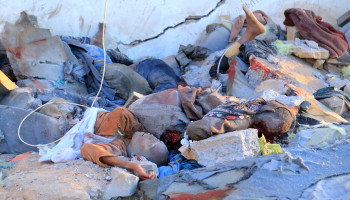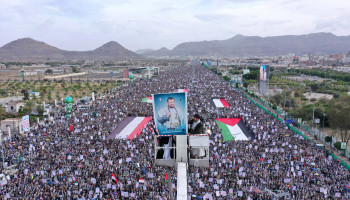As the Israeli regime, backed by the United States and supported by Western nations, continues its genocidal actions against the Palestinian people for the past 323 days, the suffering and injustice faced by Palestinians are only intensifying. Amid this grim reality, a recent report by Israel's Central Bureau of Statistics reveals a sharp increase in trade between Israel and five Arab nations during the first half of this year. The report states that the total trade volume between Israel and the UAE, Egypt, Jordan, Bahrain, and Morocco reached $367 million in June alone.
According to official Israeli data, the UAE topped the list in June with approximately $272 million, marking a 5% increase compared to the same period last year.
Trade between Israel and Bahrain saw a record increase, reaching $16.8 million this year—a staggering 740% rise from the previous year. Egypt followed, with a trade volume of $35 million, up by 29% from the previous year. An investigation by "Arabi Post" highlighted that five Egyptian ports have become key supply routes for 19 ships regularly transporting goods to and from Israeli ports during the aggression on Gaza over the past several months. The report confirmed that these ships exclusively shuttle between Egyptian and Israeli ports.
Jordan ranked third among these Arab countries with $35 million in trade, a 14% decline compared to June 2023. Meanwhile, trade between Morocco and Israel surged by 124% in June, reaching $8.5 million this year.
Shameful Positions
In stark contrast to these shameful positions, the leader of the Yemeni revolution, Sayyid Abdul-Malik al-Houthi, praised the decision of the Colombian president to ban coal exports to Israel to avoid contributing to the suffering of the Palestinian people. This decision stands in opposition to Arab regimes that continue to export fruits and foodstuffs to Israel. Sayyid al-Houthi also lauded a recent martyrdom operation in Yaffa, stressing that the resurgence of such operations is a significant and necessary step.
Furthermore, Sayyid al-Houthi highlighted that the U.S. airstrikes on Yemen's Hudaydah province this week—five in total—are a reaction to Yemen's naval decision to prevent Israeli ships or those heading to Israel from passing through the Red Sea. He noted that the United States is complicit in the atrocities occurring in Gaza and will be involved in any aggression against Arab and Islamic nations.
Drawing attention to the global community, Sayyid al-Houthi remarked that Israeli Prime Minister Netanyahu did not receive applause in Congress for his crimes but returned with increased military and political support to further his brutalities. Meanwhile, in some Arab regimes, individuals face imprisonment, fines, torture, and exile for sympathizing with the Palestinian people and their resistance fighters.
He further emphasized that it is unacceptable for the Islamic and Arab world to remain silent while popular protests continue in non-Islamic countries. He added that the driving force behind these global protests is humanitarian, while the peoples of the Arab and Islamic world share Islamic values, common interests, and national security with the Palestinian people.
Sayyid al-Houthi called for greater awareness, responsibility, and humanitarian, religious, and moral obligation among Muslims. He noted that in Yemen, this commitment is evident through the massive weekly demonstrations and hundreds of thousands of activities supporting Palestine.
He also acknowledged the Moroccan people's ongoing efforts, which stand in stark contrast to the official position of their government, which he described as treacherous and complicit with Israel. The leader lamented the deepening economic cooperation between Morocco and Israel, expressing profound disappointment.
Escalation of Resistance
In the face of this reality, Israel is anxiously awaiting inevitable retaliation from Hezbollah for the assassination of Jihadist Commander Sayyid Fuad Shukr, from Iran for the assassination of the great Islamic leader, Martyr Ismail Haniyeh, and from Yemen for the bombing of Hudaydah port.
This fear is reflected in the suspension of flights by most airlines to and from Israel, and the significant impact on the Israeli economy due to the blockade imposed by the Yemeni navy, preventing ships from reaching Israeli ports. Israel’s anxiety stems from its awareness that the retaliation will be painful and significant, and its delay is attributed to meticulous planning and precise target selection.
Sayyid al-Houthi praised the ongoing efforts of Hezbollah, noting that even Israel has acknowledged its losses and the substantial impact of Hezbollah’s operations. He mentioned that the Yemeni armed forces conducted 21 operations last week using ballistic and cruise missiles, drones, and naval vessels, targeting 182 ships involved with Israel or violating the blockade.
Historical Resistance
Reflecting on Yemen’s honorable stance, Sayyid al-Houthi reported that since the beginning of the aggression on Gaza, Yemen has witnessed 652,175 marches, demonstrations, and activities. He highlighted that more than 432,000 people have participated in training sessions as part of a mass mobilization, expressing hope for even greater involvement.
He also noted that military parades and maneuvers have reached 2,292, with weekly protests continuing in the capital, other provinces, and rural areas, regardless of weather conditions. Even in heavy rains, as seen in Sana'a and Dhamar, the determination to continue is unwavering.
Sayyid al-Houthi emphasized that the Yemeni people’s actions are in response to divine guidance, bringing great benefit both in this life and the hereafter. He declared that the Yemeni people stand in a position of honor, and future generations will look back without shame, unlike many other nations.
With the Leader
The Yemeni people's resolve aligns with the guidance of their leader. Each week, despite heavy rains, massive Yemeni demonstrations in Sana'a and other provinces take place in solidarity with Palestine under the slogan "With Gaza and Al-Aqsa... Jihad and Steadfastness Until Victory," reinforcing Yemen’s commitment to supporting Gaza militarily.
One of the participants in the demonstrations at Al-Sabeen Square, under the heavy rain, conveyed a message to the brothers in Gaza, saying, "With our Quranic culture, we are uplifted by the downpour; these rains only strengthen our resolve and confirm that we are on the path to supporting Gaza. We assure our brothers in Gaza, 'You are not alone; we are with you.'"
This commitment is further evidenced by Yemen's unique military escalation, specifically targeting the heart of Israel's strategic and geographic center, "Tel Aviv" (Yaffa), which serves as Israel's social, political, administrative, and financial hub. The targeting of Tel Aviv represents a significant escalation, particularly given Yemen's challenging economic circumstances under siege and aggression.
Arab journalist Abdul Bari Atwan expressed this escalation on his X account, stating, "This is a historic day by all measures, reflecting an unprecedented Arab victory by the Yemeni Arab army that shakes Israel, makes history, and brings joy to the heroes and their supporters in Gaza. For the first time in 76 years, an advanced Arab aircraft strikes Tel Aviv (Yaffa)... Hundreds of millions across the Arab and Islamic world celebrate this great victory."
Urgent Questions
In the wake of Sayyid al-Houthi's speech amid escalating crises and the ongoing suffering of the Palestinian people, the struggle for human justice and national liberation remains an eternal battle that transcends geography and identity. As the cries of oppression faced by Palestinians grow louder, new scandals regarding economic cooperation between some Arab regimes and Israel are coming to light.
This situation raises urgent questions about the strategic priorities of these states and their commitment to the positions of their people. As the secrets of normalization unfold, the Arab street remains in a state of growing anger. Are we witnessing an economic betrayal without justification, or is this a pressing call to reevaluate the values and priorities that should unite the Arab and Islamic nations? In light of the escalating massacres against Palestinians, it becomes clear that the Palestinian cause is not merely a local issue but a beacon of hope around which we must unite to confront the Zionist onslaught. What lies ahead amidst these drastic changes?
Raising Awareness
In this context, Sayyid al-Houthi highlights the role of the Arab Muslim citizen, from the Atlantic to the Gulf, as a concentrated and significant force in raising Arab and Islamic awareness of the importance of joint action. Particularly among the youth, who should become effective agents of change, launching larger solidarity campaigns with the Palestinian cause. Moreover, the humanitarian call grows louder, urging scholars, intellectuals, party leaders, and civil society organizations to take responsibility for combating this lethargy.
He pointed out that the million-strong marches in Yemen and other countries of the axis underscore the need to express a kind of unity that the Arab and Islamic world currently lacks. The solidarity demonstrated by the Muslim Arab people in Morocco and elsewhere highlights the urgent need to unite the Arab and Islamic nations in the face of the formidable challenges posed by the obstinate Zionist entity, bolstered by unwavering Western support. Let's give Arab youth the chance to ignite movements of liberation from the poverty and humiliation imposed on them by compliant regimes. It is time to turn their suffering into a driving force for Arab-Islamic solidarity against common enemies.
New Horizons
Sayyid al-Houthi noted that the ongoing shifts in U.S. policy and the changing global stance on Palestine represent a new window for the Arab and Islamic nations to explore new ways of addressing crises. The victories achieved by the Yemeni army offer the Islamic world new perspectives for benefiting from the Palestinian struggle within a broader context of Arab-Islamic alliances. Even if not aspiring to such heights, they at least represent a fresh start for international cooperation against Israeli violations, a pressing call for Arab-Islamic unity, and a strategy that everyone must adopt to face the dangers surrounding the nations.








